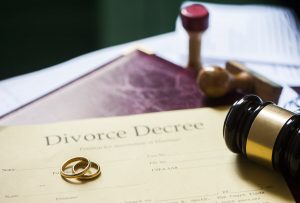Content Reviewed by: Nasheia Conway •
April.29.2019 Vertified Content
Apr 29, 2019 | Read Time: 5 minutes

These cases are said to be “uncontested.”
However, you still have to present evidence at a hearing. The court cannot just grant a divorce unless they have some facts on the record.
This post explains exactly what you need to know, what you need to bring, and what you will need to testify about.
Here is what you need to know about your date in Court:
- Be Prepared: We will discuss all of this before the date, but there is one big thing you have to get lined up well before your court date – a witness. You have to ensure that you have a witness that can testify to the facts as you have alleged. (See below for more details.) This witness must be over the age of 18 and must know certain things about you and your soon to be ex-spouse. Often, this is a friend or family member who knows you are separated, live alone, etc.
- Don’t be Late: On the day of the hearing, you will want to arrive 10-15 minutes early. You will need to find the Courtroom where your case is being heard. You and your witness should check in with the Court.
- Check In: Each courthouse has different rules for “checking in”. Some require that you fill out a form, some will call your case as they go through their list of cases, and some have staff members in the Courtroom. Be sure to ask your attorney about what is expected. If you are not represented, ask a staff member in the Courtroom about what is expected.
- Hurry Up and Wait: The Court will have other cases on the docket, and you will have to wait for your case to be called. We will never be 100% sure if your case will be first, or last. You have to show up on time and be ready.
- Q & A Time: Once the hearing begins there are certain questions the Court will need to have you answer. We will go over them in a preparation meeting, but here are some examples:
- How long have you lived in Maryland?
- Where and when were you married?
- Were there any children born of the marriage?
- Are you over the age of 18?
- Who are you married to or what is the name of your spouse?
- Are there any issues that need to be resolved?
- Testimony from You: The Court will expect further testimony from the parties or the Plaintiff on the grounds of the divorce. This would be what is in the Complaint and what is required for the Plaintiff to prove that they deserve a divorce from their spouse. There are specific questions that need to be asked for each different ground for divorce. Consulting an attorney can help with the more specific questions on the grounds for divorce.
- Can I get a Witness? Once the Plaintiff has testified the Court will turn to the Plaintiff’s witness. IF YOU DO NOT HAVE A WITNESS YOU WILL NOT GET DIVORCED. I cannot stress this enough. So many people come to Court without a witness to corroborate or “back-up” someone’s testimony and do not get their case heard. The Court will reschedule your case if you do not bring a witness. Here is what your witness needs to know:
- That you are a resident of Maryland or that the other side is.
- That you are over 18.
- That you got married at the time and place you say you got married. If the witness was not there, they need to have seen pictures, or rings, or at least have known you to hold yourself out as married.
- They need to know about any children from the marriage.
- The witness also needs to know some specifics for the grounds for divorce that the Court is going to use to grant your divorce. Because each ground is different and each witness needs to know certain things you should consult an attorney before the hearing so that you pick the right person as your witness.
- The Other Side: After you and your witness have testified, the other party gets a chance, if they are even present. In an uncontested divorce, where there are no issues except the divorce itself, often the Defendant does not have to be at Court.
- The Devil in the Details: Once you and your witness have testified and the other side has had the option to do so as well, the Court will make its findings. Whether in front of a Magistrate or a Judge, there are certain differences that can occur. But most likely the Court will sign and send a Divorce Order to both parties that grant a divorce to the Plaintiff.
- Finish Line: Until you receive a Court Order that has been signed by a Judge you are not divorced. I repeat, you are NOT DIVORCED until you get that Order. So do not get married until you are actually divorced. Yes. This happens. Even after you receive the signed Court Order you still have to wait thirty (30) days for it to be finalized and beyond any appeal.
Conclusion
If you have questions it is always a good investment to talk to a lawyer. Again, we will prepare for this testimony in a one on one meeting, but this list should give you a preview.
Want to know more? Discover what you need to know about divorce in Maryland. Click here to see our Free Legal Consumer Guide to divorce cases in Maryland and get answers to your questions today. Click here to read our Free Legal Consumer Guide to Child Custody. Know your options. Be informed. Protect yourself.
Need a divorce lawyer or child custody attorney? Please contact us for a consultation today if you need a Maryland divorce lawyer for your family law case.
Like our blog? Subscribe to our email newsletter and stay informed!






